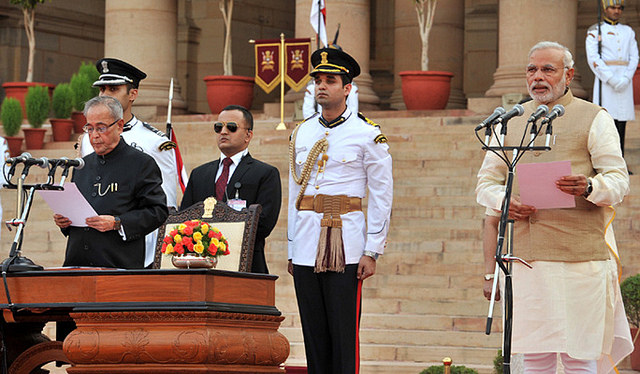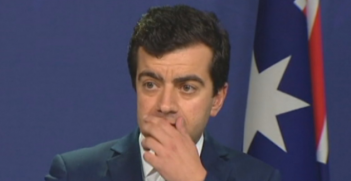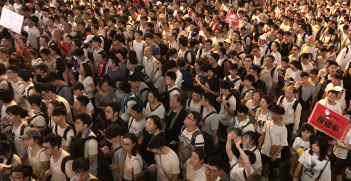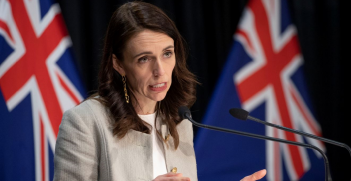An Interim Report Card on the Modi Government

Three months into Prime Minister (PM) Narendra Mod’s tenure, how do we assess his record to date? So far he has neither delivered on the exaggerated expectations of enthusiasts nor vindicated the worst fears of detractors. He is proving to be practical, not ideological, pragmatic rather than dogmatic.
The clearest articulation of Modi’s vision came in the traditional PM’s Independence Day speech on August 15. Typically PMs pronounce with pride India’s shining accomplishments while sounding warnings to mischief-minded foreign powers. Modi broke from tradition in the substance of his address and the barnstorming nature of his performance in an extemporaneous 70-minute address in Hindi.
Modi began by saying he spoke as India’s First Servant, not PM. Acknowledging the contributions of all predecessors, he insisted that national upliftment was not just the duty of government but the individual, family and collective responsibility of the people. He attacked the mentality of mera kya (what’s in it for me?) and if nothing, mujhe kya (what’s it to me?). If every one of India’s 1.25 billion people took one step forward, he noted, India would move forward 1.25 billion steps. References to skill development, digital India, e-governance, balance between imports and exports, manufacturing, and the abolition of the Planning Commission were along expected lines.
But then Modi raised the shameful spectre of rapes and asked parents to take responsibility for the behaviour of sons as well as safety of daughters. He attacked the preference for sons over daughters and sex-selective abortion. He surprised again by raising the issue of cleanliness and sanitation. Pointing to girls who don’t go to schools because there are no women’s toilets, Modi noted the indignity that “our mothers and sisters have to defecate in the open” and risk assault by heading for the fields in darkness: “I come from a poor family, I have seen poverty. The poor need respect and it begins with cleanliness.”
Modi brought up public squalor that spreads disease and revolts and deters tourists. Tourism profits luxury hotels, but also the poor street hawkers, auto-rickshaw drivers and tea vendors, of whom he used to be one. Although not the issues citizens are used to hearing from their PM speaking from the ramparts of the Red Fort, these are fundamental in putting India back on track. Rather than warning foreigners against threatening harm to India, Modi invited neighbours to join India in eliminating poverty from South Asia.
He challenged the prevailing culture of chalta hai (this will do for India as a poor developing country). The rising class of aspirational Indians insist only the best will do with quality of goods and services from the public and private sectors alike. Modi referenced news accounts that civil servants were clocking into office on time since he took office: “it shows how low we have fallen” that this was newsworthy. While inviting foreign firms to “come, make in India,” he exhorted Indian workers to aim for exporting products all over the world with “Made in India” as a badge of quality, not cheapness.
India has not seen the likes of Modi before. But was it just rhetoric at odds with actions? India’s and Pakistan’s foreign secretaries were scheduled to have met for official dialogue on August 25. As in the past, Pakistan’s High Commissioner to India Abdul Basit met first with separatist leaders from Kashmir to gauge their expectations, despite being advised by the government against it. Delhi then cancelled the talks, to general criticism by both Indian and international media as being contrary to the goodwill generated in inviting all South Asian leaders, including Pakistan’s Prime Minister Nawaz Sharif, to his inauguration. But there is no necessary contradiction: both gestures might signal there is a new regime in town and business is no longer as usual. If Modi finds a partner for peace across the border, he may be willing to cut deals. But actions that India finds provocative will have repercussions and consequences: gone are the days of shrugging haplessly.
By contrast the budget presented earlier was so lacklustre it could easily have come from the previous government. Forceful measures are required urgently to reverse economic stagnation. FDI was expanded in some sectors, including defence, but not opened in the retail sector, which would create jobs and benefit consumers with a competitive lowering of prices and improvements in quality and service. Despite cheap talk of “tax terrorism,” the intensely investment-deterring retrospective tax was not lifted. After the lost decade under the previous government, each additional year of delay in instituting necessary reforms will make it correspondingly harder for India to catch up to global benchmarks. Politically too tough measures are better introduced early; each succeeding year in the five-year parliamentary cycle will circumscribe the political space ever more tightly for difficult policy settings in favour of populist gimmicks.
Modi had also let slip a golden opportunity to negate lingering concerns over his attitude to Muslims. On July 17, during the holy month of Ramadan when Muslims fast from sunrise to sunset, a group of BJP-allied Shiv Sena MPs force-fed a Muslim catering staffer. Modi should have taken to national TV to come down hard on the errant MPs and emphasised forcefully that India is a nation of many faiths, he is the PM of all Indians, his government promotes the welfare of all sections, and intolerant incivility has no place in modern India.
These are early days still. Perhaps Modi is replicating his Gujarat model of successful development and good governance – learn to walk before you start to run. Rather than rush headlong and in a headstrong manner; he first wants to study and understand the many and significant problems confronting the country, and then launch sustained drives to address and overcome them. Even so, having talked the talk, he must walk the walk sooner rather than later by drawing on the exceptional mandate given to him: the biggest electoral mandate of any in human history.
Ramesh Thakur is Director and Professor, Centre for Nuclear Non-Proliferation and Disarmament, Australian National University. He co-edited, with Gareth Evans, Nuclear Weapons: The State of Play (CNND, 2013), with Maria Rost Rublee the four-voulme Nuclear Politics (Sage, 2014), and is the author of Nuclear Weapons and International Security (Routledge, forthcoming 2015).





